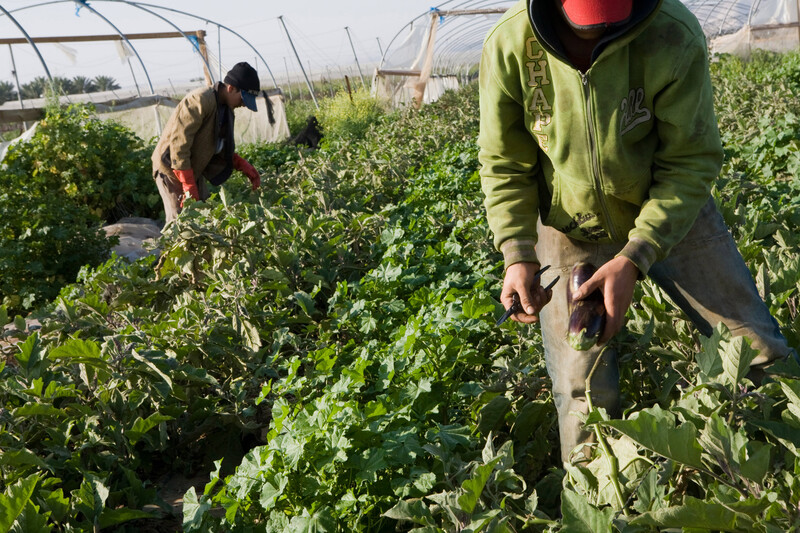Rights and Accountability 17 January 2020

By denying Palestinians the ability to cultivate their land, Israel has pushed many into working in settlement farms under highly exploitative conditions.
ActiveStillsIsraeli agritech companies “are deeply complicit in the occupation of Palestinian and Syrian land,” according to a new report by the corporate watchdog Who Profits.
Technology developed in the context of the occupation is used by Israel’s seemingly benign precision agriculture industry. This civilian application allows Israeli military companies to promote “a sanitized version of their repressive technologies” as tools to combat climate change and world hunger.
Israeli agritech companies “develop and market smart irrigation systems, crop protection solutions and specialty fertilizers to farmers across the world, raking in billions of dollars in annual sales, while enjoying a positive ‘green’ image,” Who Profits states.
This industry contributes to agriculture in West Bank and Golan settlements, as well as the de-development of the Palestinian economy.
The Jordan Valley, the main agricultural region in the West Bank, is under full Israeli military control.
Israel transferred ownership of lands seized in the Jordan Valley to the World Zionist Organization during the 1980s. The organization leases the land to settlers for agricultural production.
Produce from Jordan Valley settlements, such as pomegranates, almonds, dates and olives, are exported to Europe, often mislabeled as “Product of Israel.”
The World Bank conservatively estimated the value of settlement agricultural production in the Jordan Valley to be $251 million in 2013.
That same year, the World Bank estimated that agricultural cultivation of West Bank land currently under full Israeli military control would deliver an additional $700 million per year to the Palestinian economy.
Palestinians are prevented from cultivating their land and are deprived of income, forcing many to “seek employment in settlement agriculture, often under deeply exploitative conditions,” Who Profits notes.
Israeli leaders, including Prime Minister Benjamin Netanyahu, promise to unilaterally annex the Jordan Valley.
Entrenchment of unilateral annexation
Israel has already claimed to have annexed the Golan Heights, Syrian territory captured by Israel during the 1967 war. The UN Security Council declared that move “null and void and without international legal effect.”
Approximately 340 Syrian villages and farms in the Golan Heights were destroyed by Israel, which built Jewish settlements in their place.
Some 26,000 Israeli settlers enjoy control over 95 percent of the Golan – a landmass of 1,860 square kilometers representing 1 percent of Syria’s total territory. Approximately the same number of Syrians have control over the rest of the Golan’s land.
“In the occupied Syrian Golan, settlement agricultural production also contributes to land grab, de-development of the local Syrian economy and entrenchment of Israel’s unilateral annexation of the territory,” Who Profits states.
Agricultural production in Gaza has been “decimated” by Israel’s siege, imposed since 2007, and repeated military assaults on the territory.
Palestinians are prevented from accessing a poorly defined area generally understood to be within 300 meters of the boundary with Israel. Much of Gaza’s agricultural land is encompassed by this no-go zone, which Israel enforces with live fire.
“Weaponization” of agritech
Israel has “weaponized” agritech against Gaza, according to Who Profits, by using herbicides “to damage and destroy Palestinian crops” in the perimeter area. On Tuesday this week, Israeli crop dusters sprayed chemicals believed to be herbicides that drifted into Gaza.
“Israel conducts the spraying when the wind is blowing westward, which carries the chemicals deep into Gaza,” human rights groups stated on Thursday.
“Herbicidal chemicals have reached distances as far as 1,200 meters into the Strip in previously documented incidents of spraying.”
The rights groups added that data indicate “that the spraying poses a potential threat to the right to life as it directly undermines food security and health of the civilian population in Gaza.”
Agritech firms meanwhile “benefit from the commercialization of Israeli military knowledge” developed in the context of the occupation.
“Collaborations include the adaptation of the Iron Dome command and control system for smart irrigation as well as the use of Israel Aerospace Industries military drones for large scale precision agriculture,” according to Who Profits.
“The reality of a prolonged military occupation has been the driving engine behind a prolific and highly profitable defense industry, resulting in a symbiotic relationship between the private sector and the state military apparatus,” Who Profits states.
The civilian agritech sector benefits from Israeli government subsidies for research and development in the West Bank and Golan Heights, finding in the framework of occupation “a testing ground for the development of products and technologies.”
Who Profits states that the extension of military technology into civilian industries “further cements the vested interest of private corporations in the perpetuation of the status quo.”





